Abstract
Any career is built in time, through consistency and effort, based on a solid training, in a correct relationship with who we are and what we can do with the opportunities we identify at some point. Our career path starts with the course of studies, when we clearly distinguish between our knowledge interests to be well prepared in a certain area of specialty, with a mandatory choice of a route/specialization out of the educational offer of a faculty. Therefore, we should make the right decisions and constantly plan our career development. This career planning process may be acquired and applied throughout our life by covering a few main stages or it may be achieved spontaneously, under the influence of chance. This paper aims at highlighting the habit of three hundred 1st, 2nd, 3rd year students of POLITEHNICA University of Bucharest, regarding their own career planning, and we expect that planning model of the self-oriented type based on awareness, rigorous analysis and proper information should undergo variations from one year of study to the other. The research method used was the questionnaire-based survey and the data processing of the two questionnaires used during the research confirmed the working hypothesis.
Keywords: CAREER planningself-oriented modelchance-luck modelcareer planning strategies
Introduction
Professional counseling is presented as one of the solutions for improving educational
performances and access to the labor market. Career counseling and schooling guidance are discussed as
the approaches which can help youngsters better manage their professional lives, from choosing the right
school or university to follow, up to finding the proper workplace (Enăchescu, Roşca, 2014). Career gives
the measure of profession progress of any individual throughout his/her whole life. Within the same
profession, the career of an individual may record specialization, professional improvements or
promotions (Tăsica, 2002). The actual choice of a career starts when we get aware and define the intention
to attend certain studies and practice a profession. This process of awareness and definition of the
intention in the direction of an appropriate education which will result in practicing a profession, depends
on internal factors (skills, attitudes, values, etc.), but also external factors (family, social models, job
market, etc.), (Chircu, 2015). Skills development for career planning to manage coherently and
constructively the internal and external factors is imperative, especially when the discrepancy between the
two factors often generates dissatisfaction, manifested as a dissonance between what we like to do and
what we come to practice. The student years mean first and foremost a crystallization of the educational
route, the university studies leading the student, due to the perseverance of attending them, to the point of
providing them an applicative dimension, by exercising them in a job. In this stage, career planning means
for the student the ability to determine correctly and concretely educational and professional objectives
which, by correlation with appropriate actions, might lead the student to the career target. Generating an
efficient system of professional counseling involves analyzing various factors that affect the degree of
involvement of students in the management of their careers (Aroca, Romero, Paredes, 2016).
The chance and luck type of career planning is based on the following vision: to get the wanted
job, one must rely on chance and luck, thus exclusively insinuating the power of factors upon the career,
chance and luck often being equated with one’s relationships and, perhaps, the opportunity to catch the
right context in order to obtain the targeted job. In opposition, the self-oriented model of career planning
fosters the individual’s ability to rely on his/ her own resources, consciously combining in an informed
way the internal factors (own skills, for example) with the external ones (job market opportunities, our
relationships) when determining and crossing the road towards the wanted job (Byars, Rue, 1987). The
guidelines of the Resolutions of the European Union Council (2003-2004) emphasize the need of placing
the student in the center of the counseling services, so that the accent should shift from school or
professional decision assistance to the development of his/her ability to manage his/her own career.
Consequently, a self-oriented model of career planning is proposed, based on targeting the assistance
supplied by the career counseling and orientation services in the direction of developing students’ abilities
to plan their own career. Interventions by the counseling process either individual or group must follow
the correct evaluation of the students, creating what is called a primary diagnosis, encouraging students to
reflexivity, self-guidance concerning abilities, self-motivation for action, developing a solid identity in
professional, academic and personal field (Obaya, Vargas, 2014). The proper implementation of certain
counseling and orientation services based on a self-oriented approach of career planning becomes
achievable first by the identification of the level of development of such self-oriented approach of
development in career planning amidst the students and, further on, by adjustment of the specialized
actions either in a remedial direction, or in a consolidation one.
Methodology of Research
This paper aims at identifying the way in which students would plan their career: relying on good
luck and chance or consciously, sensibly, connecting to competencies.
We operate with the following hypothesis: we expect that the self-oriented approach used by the
students in career planning should incur certain variations from one year of studies to another.
The research was based on the data obtained during the term of two projects,
POSDRU/161/2.1/G/136211 „Successful career in engineering sciences” and
POSDRU/161/2.1/G/136010 „Career counseling, practise for success” performed at the Faculty of
Technological Systems Engineering and Management of POLITEHNICA University of Bucharest, both
having as an objective enabling students’ transition to the job market, by participating in group or
individual professional practise stages and career counseling and orientation services.
The questionnaire-based survey was used as a method of research, which “is almost always an
opinion poll” (Iluţ, 1997). By means of the questionnaire, as an investigative tool, questions are asked and
problems are raised which determine various answers from the inquired persons. The questionnaire-based
survey has also a standardized character, because the questions are clearly pre-formulated, just like their
number and order (Chelcea, 2004).
As a research tool, the questionnaire plays a double role: it provides for stimuli for respondents and
support to record their reactions. In this research we render valuable the results of two questionnaires data
processing, applied sequentially throughout the two projects. The first questionnaire was applied at the
end of the group counseling sessions and includes 18 items which aimed at identifying the students’
opinions on their own professional insertion on the job market and of the factors which enable or hinder
this career stage. We will present the results of 5 items which allow attaining the stated objectives, among
which 3 items are pre encoded: items no. 7 (time invested in specialized training), no. 12 (on persuading
the students about the profession in their line of expertise), no. 17 (work experience during university
years), one item is mixed, enabling an answer ranking, with a variant of open multiple choice of the type
„other, which?”: item no. 2 (sources of educational and career information used during student years),
and another open item no.18 (specifying the activities which assure a minimum professional experience
acquisition since the university years). The second questionnaire was applied at the end of the individual
counseling sessions, it aimed at the identification of career expectancies of students, consisting in 5 items,
of which we will render valuable the results obtained from data processing of only one mixed item, item
no. 4 (opinions on the progress of studies).
The sample consists in a lot of 300 students, enrolled in the 1st, 2nd and 3rd year of studies,
beneficiaries of the two projects. We used a random stratified sampling, where the stratification criterion
consisted in the year of studies (among which 100 respondents enrolled in the 1st year, 100 in the 2nd
year and 100 in the 3rd year). The data were processed by means of SPSS 20.0 (Statistical Package for the
Social Sciences) software, using methods of descriptive statistical processing.
Results
We use for the verification of our hypothesis, stating that we expect the self-oriented type approach
used by the students in career planning to incur certain variations from one year of studies to another, the
four-step strategy of career planning, congruent by logic and coherence with the self-oriented approach, as
follows: 1. Identifying the problem, 2. Collecting information, 3. Career decision-making, 4. Action plan
development.
3.1.Identifying the Problem
Identifying a problem means, first, defining the problem. The problems that may arise during
student years are varied, of course, and a careful planning is required to overcome such problems (retakes,
difficulties of adaptation to the teaching style of certain academic staff in major subjects or to student life
in general, poor guidance in relation with the way in which one can acquire professional experience since
student years etc.), but those that may be considered essential from the point of view of the coherence of
the effort and time invested in education are related with the doubt to work in the line of expertise. Thus,
at the question “Do you think you will work in your line of expertise” 66% of the 1st year investigated
students had an affirmative answer, this conviction of practising in the line of expertise drops in the 2nd
year to 43% and 50% undecided, then a raise is recorded in the 3rd year of studies to 56%.
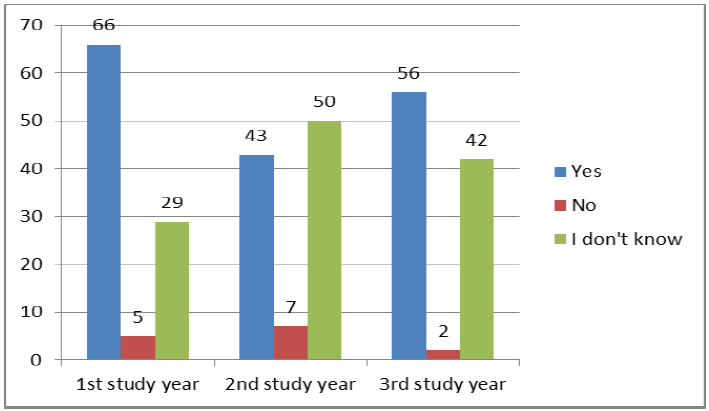
3.2.Collection of Information
The briefing on the opportunities of academic training or available jobs and the conditions required
to get them is an important and necessary alternative that the students must consider in the process of their
own career planning. When they were asked what sources of educational and career information they use,
the students in all three years of studies indicate the faculty website and the employment websites as their
main sources of information, another credible source is the faculty registrar’s office.
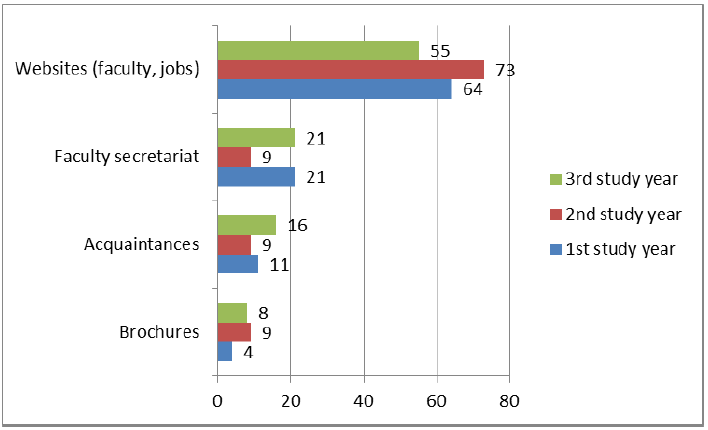
3.3.Career Decision-making
Career decision-making is part of the category of important decisions, in particular through the
consequences in time. During the student years, career decision-making becomes necessary when, for
example, we just choose an educational path (for example, STEM faculty – specialization: Robotics,
master degree in Industrial Engineering) or professional skills training (by internships, additional training
courses etc.). Gaining professional experience during the university years, by getting a job while studying
and/or participating in internships, etc. becomes useful for professional skills training. So, the decision of
gaining such an experience provides for the students, besides the opportunity of putting into practice and
practicing certain professional skills, a clearer perspective on the job market, familiarizing them with the
identity of an employee with responsibilities and developing the trust in their own forces by exercising the
sense of usefulness. According to the data obtained at the open item “Specify the activities which help
you acquire a minimum work experience since the university studies“, half of the 1st year students already
participate in volunteering actions, 60% of the 2nd year students state that they participate in internships
and volunteering, and in the 3rd year, though the interest is in decline for these kind of activities, it is
frequent for internships. Concerning the employee experience of students during studies, the recorded
values show that the employee experience appears in 26% of the 1st year investigated students; it rises in
the 2nd year student to 60% and records a decline in the 3rd year to 43%.
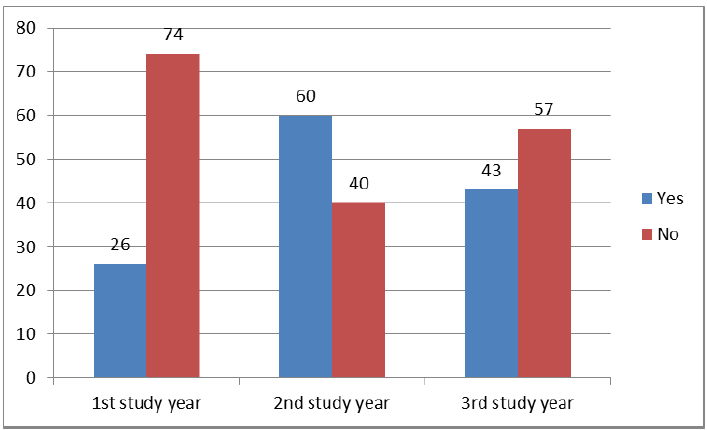
3.4.Action plans Development
Developing action plans concerning the career must be natural during the student years, one of
them and of major importance as it sums up all the other actions in the direction of the career, consisting
in the time dedicated to study. The time dedicated to specialized training decreases also in the 2nd year of
studies (54%) as compared to the 1st year (65%), and then it records an increase in the 3rd year (68%).
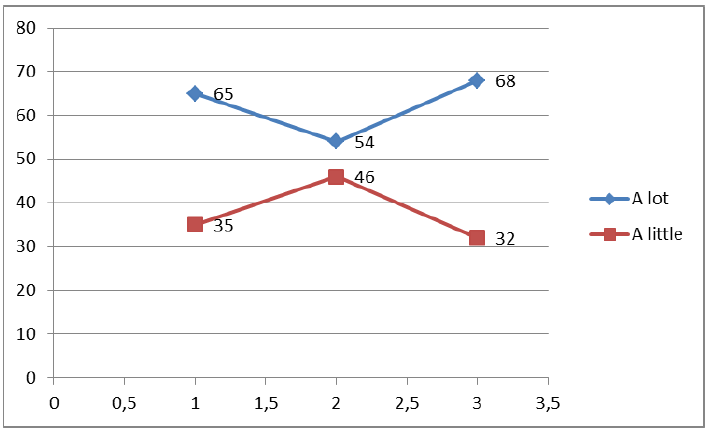
Another necessary action plan aims at the studies elected after the completion of the undergraduate
studies. Analysing the students’ statements regarding the progress of their studies, the data show that the
decision to enroll for a master program in the same area of studies becomes natural in the evolution of the
education plan, both for 1st year student and for 2nd and 3rd year students. The doctor’s degree in the area
of studies is, also, in the plan of the students of all three years of studies, though with a lower weight.
Thus, 29% of the 3rd year students record a state of expectation regarding the sequence of the educational
path stages, stating that they expect to obtain their bachelor’s degree first and then they will think of the
other stages of their career.
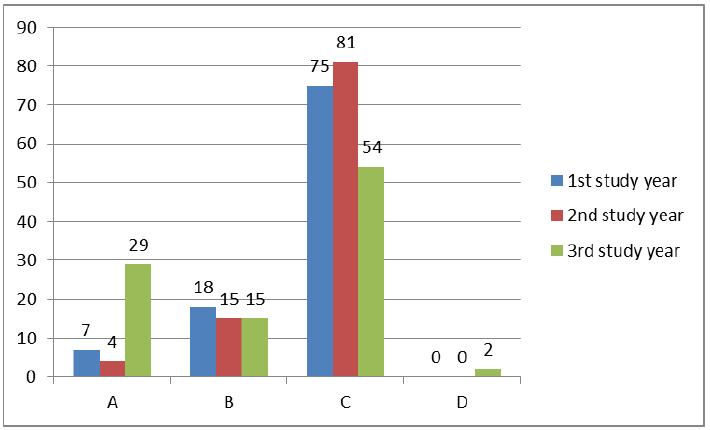
A= I wait to get my bachelor’s degree at the moment; B= I intend to enroll for a doctoral program in the field;
C= I intend to enroll for a master program in the field; D= I am not sure yet
Interpretation
The analysis of the results obtained from data processing confirms the working hypothesis ”We
expect that the self-oriented approach used by the students in planning their careers should incur
variations from one year of studies to the other”. Thus, at the question “do you think you will practise in
your line of expertise” we notice that 66% of the 1st year investigated students gave an affirmative
answer, while the conviction of practising in the profession decreases in the 2nd year to 43% and 50%
undecided, with an increase in the 3rd year to 56%. When asked what educational and career sources of
information they use, the students of all the three years of studies indicate the faculty website and the
employment websites as the main sources of information they resort to, another credible source is the
faculty registrar’s office. The interest for participating in volunteering actions, internships, is a useful and
compensator one for the employers concerning the lack of work experience of the new graduates and
often invoked as a disadvantage. According to the data at hand, half of the 1st year students already
participate in volunteering actions, 60% of the 2nd year students state they participate in internships and
volunteering, and in the 3rd year the interest, though in decline for this kind of activities, is frequent for
internships. Concerning the employee experience of the students during their studies, the recorded values
show that the employee experience is in 26% of the 1st year investigated students, it increases in the 2nd
year to 60% and records a decline in the 3rd year to 43%. The time dedicated to specialized training
decreases too in the 2nd year of studies (54%) as compared to the 2st year (65%), and records an increase
in the 3rd year (68%). Correlating the data obtained from the analysis of the items of the two
questionnaires we can notice that, out of the 26% 1st year employed students, over 20% do not work in
their area of specialty or related field from the point of view of competencies, the jobs mentioned by the
students are part-time and mainly in activities such as: seller, call center operator, jobs in the beauty
industry in the case of the girls etc. Their number increases in the 2nd year to 60%, while most of the
students keep both the part-time job, and the fields of activity as above, outside their specialized skills.
We are able to explain now the hesitant answers of the 1st and 2nd year students in relation with
practicing in the line of expertise. Practicing the engineer profession during university studies is difficult,
at least in the first two years of studies, because it requires certain competencies which are getting shape
by gradual acquisition (especially for the students coming from theoretical high schools), in the 3rd year
of studies only can we speak about a clarification and adaptation of technical skills which enable their
application into practice. We may note the interest for employment is in decline in the 3rd year, half of
those who are employed say that they have part-time jobs in their line of expertise (mainly in mechanics
and car industries), while the time dedicated to studies increases. On the other hand, 29% of the 3rd year
students record a state of expectation regarding the sequence of the educational path stages, stating that
they expect to obtain their bachelor’s degree first and then they will think of other stages of their own
career.
Conclusions
When planning their careers, the investigated students of the three years of studies alternate the
approaches having no specific direction to the self-oriented approach. The intervention by professional
counseling and orientation enable the career planning process in the direction of adopting to a larger
extent the self-oriented approach, because it allows a debate and clarification of what the engineer
profession actually means, the time required for building the necessary skills avoiding, for example, the
disorientation of the 2nd year students who manifest hesitations regarding the conviction of practising in
their line of expertise. At the same time, a simple debate of the way in which the student conceives his/her
own future profession and the necessary steps, with the career counseling and orientation specialist in
universities, enables the student a better awareness of the fact that a plan of preparing and completing the
educational path and his/her professional debut is necessary. The assisted development of his/her career
plan provides for the student the benefits of a better awareness and a more comfortable self-control in the
direction of the completion of his/her educational path, i.e. to practice his/her engineer profession.
References
- Aroca, M.A.R., Romero, J.E.B., Paredes, C.A. (2016). Consejerías Académicas en la ESPOL: evolución e
- impacto en la comunidad politécnica. In M. M. Larrondo Petrie, H. Alvarez (Eds.), Engineering Innovation for Global Sustainability: Proceedings of the Fourteenth LACCEI International Multi-Conference for Engineering, Education and Technology. San José, Costa Rica: Latin American and Caribbean Consortium of Engineering Institutions.
- Retrieved from http://www.laccei.org/LACCEI2016-SanJose/meta/RP379.html Byars, L.L, Rue, L.W. (1987). Human Resource Management: Ed Homewood Irwin.
- Chelcea, S. (2004). Metodologia cercetării sociologice. Metode cantitative şi calitative, ediţia a II-a. Bucureşti: Editura Comunicare.ro.
- Chircu, S. (coord), (2015). Planificarea carierei. Strategii eficiente pentru studenţi şi absolvenţi. Bucureşti: Editura Politehnica Press.
- Enăchescu, V.A., Roşca, V. (2014). Educational Counseling Approach for the Romanian Educational System. Review of International Comparative Management Volume, 15(3), 321-333.
- Retrieved from http://www.rmci.ase.ro/no15vol3/06.pdf Iluţ, P. (1997). Abordarea calitativă a socioumanului. Iaşi: Polirom.
- A. Obaya, A., Y. Vargas, Y. (2014). La tutoría en la educación superior. Educación Química, 25, 478-487.
- Retrieved from http://www.scielo.org.mx/pdf/eq/v25n4/v25n4a12.pdf Tăsică, L. (2002). Tehnologiile informatice şi de comunicare în consilierea carierei. Bucureşti: Editura Afir.
- www.carieraininginerie.ro, visited on: 2.06.2016 www.practicapentrusucces.ro, visited on: 2.06.2016
Copyright information

This work is licensed under a Creative Commons Attribution-NonCommercial-NoDerivatives 4.0 International License.
About this article
Publication Date
25 May 2017
Article Doi
eBook ISBN
978-1-80296-022-8
Publisher
Future Academy
Volume
23
Print ISBN (optional)
-
Edition Number
1st Edition
Pages
1-2032
Subjects
Educational strategies, educational policy, organization of education, management of education, teacher, teacher training
Cite this article as:
Doicin, C. V., & Chircu, S. (2017). Tendencies In The Career Planning Of Students. In E. Soare, & C. Langa (Eds.), Education Facing Contemporary World Issues, vol 23. European Proceedings of Social and Behavioural Sciences (pp. 908-915). Future Academy. https://doi.org/10.15405/epsbs.2017.05.02.111

